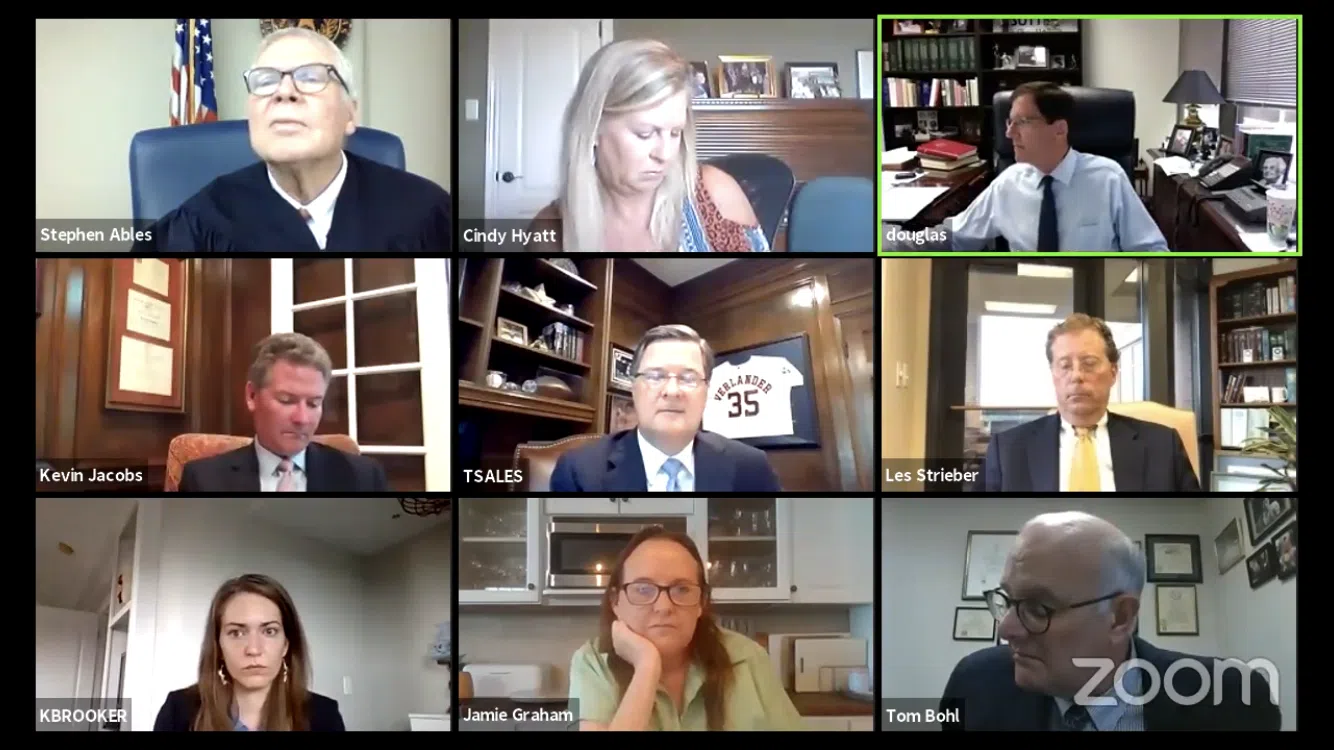(Seguin) – Lakefront property owners and the Guadalupe-Blanco River Authority are soon headed to mediation before Judge Deborah Hankinson, a former Texas Supreme Court Justice and Appellate Attorney.
The plaintiffs are suing GBRA for dam failures that have occurred along the Guadalupe Valley hydro-electric dam system.
Due to her mediation arbitration expertise, Judge Hankinson has reportedly been called in to settle or perhaps help streamline the pre-litigation process between both parties who remain at odds over who is ultimately responsible for the repair and or replacement of the aging dams.
The mediation was already in order prior to Tuesday morning’s Zoom hearing before Visiting Judge Stephen Ables. The plaintiff’s attorney Doug Sutter and GBRA Attorneys Travis Sales and Kevin Jacobs, of the law firm Baker Botts of Houston, were all on hand to file their respective motions to compel in the litigation process that began almost one year ago.
Much of the hearing was to gain a directive for each of their respective motions. The motions, for the most part, sought the need for additional information needed by each side for the case.
One by one, the judge heard requests such as the release of fee agreements and/or requests for disclosure of all three law firms employed by GBRA and the release of all communication between GBRA and the Sunset Advisory Commission. As shared in a previous hearing, the commission released a two year extensive investigation of GBRA releasing detailed information in regards to the assets and facilities of GBRA and the maintenance of the dams.
During the hearing, Judge Ables also set a firm deadline for those plaintiffs who no longer show that they are active in the litigation.
The deadline was in response to GBRA’s motion to compel for the lack of plaintiffs who have brought forth the necessary information to move forward. Jacobs says since the very beginning, the process allowed for many opportunities.
“We are here on a motion to compel as to many of the plaintiffs because they failed to provide the most basis of information in the case and they have had months and months and months to do so. We laid that out very clearly to the court. The first set of discovery that we sent to the plaintiffs was back in October. They had 60 days to respond pursuant to the court’s rulings that we were to start discovering earnest in December. When we sent Mr. Sutter a deficiency letter in mid-December identifying by chapter and verse every plaintiff that was deficient and it was a lot of them. We then sent some additional discovery in January. We sent a follow up letter in January and we then we finally filed a motion for the first time in February. We sent a follow up letter to Mr. Sutter in April – and its basic discovery – tell us about your property, when did you get it, how did you get it because your honor, they are asking for essentially the Chapter 2007 Relief which goes to property value issues and the request that we ask for — all reasonably calculated to confirm what the plaintiff’s property interest is and reasonably calculate it as to what the value of the property may or may not be,” said Jacobs.
Again, Jacobs says people have had more than enough time to comply.
“In our view, your honor, is for the ones that have not provided nothing, it’s time. The remedy for them ought to be dismissal. I’m confident Mr. Sutter has sent them letters. I’m confident Mr. Sutter has communicated with them that they need to provide discovery answers. I’m confident they have been provided copies of our motions. They know they haven’t responded and it’s been months and months and months. It’s been far longer than I can recall in any case that I’ve been in in a long long time that these folks have had,” said Jacobs.
The number of people who have not responded to their request is one thing that Sutter says he can agree with. He says initially, the plaintiff’s list began with 360.
“Quite frankly, when we started and people hired us and signed our agreement, there were a few of them that thought they were signing a petition — a petition where you get down and say ‘hey, please do something’ and you notice there has been some non suits because we have no suited people that we have learned do not have lakefront properties. We’ve also non-suited some people who are elderly and don’t want to participate and a couple of other people, who don’t want to participate in discovery,” said Sutter.
During the hearing, Ables provided the deadline and started the clock for both sides to narrow the scope of the plaintiffs.
“As for those folks who haven’t responded, if they don’t respond fully within 15 days, then I’m going to dismiss their claims,” said Ables.
The hearing, again made public on Zoom and YouTube, took approximately one hour. It has been five months since both sides have been in front of Judge Ables.
In September, both sides reached an agreement to delay any dewatering until a consensus was reached by both sides or until the original plaintiffs returned to the courtroom for an October 2020 trial. Since the original plan to have the lakes drained in September of 2019, the groups have met multiple times in the Guadalupe County Justice Center.





